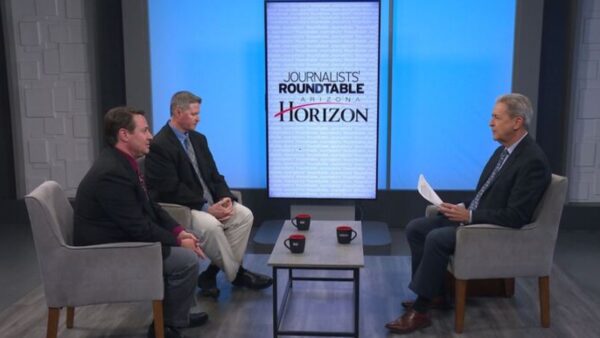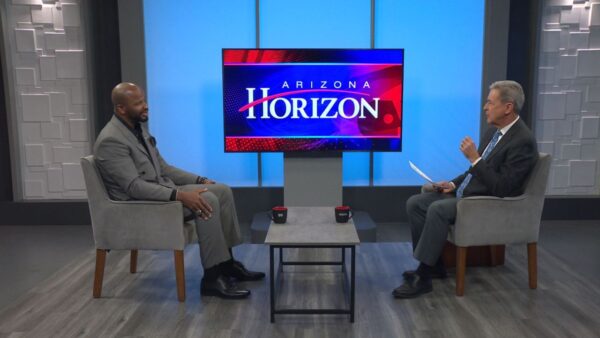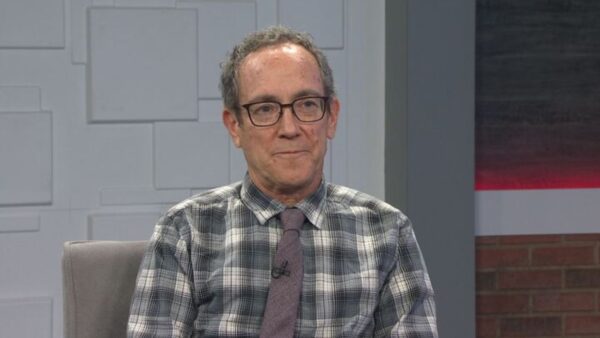A special legislative committee has started looking at possible ways to consolidate Arizona school districts. Hear from members of that committee, Senator Rich Crandall and Superintendent of the Tolleson Union High School District Margo Seck.
Ted Simons: Good evening and welcome to "Horizon." I'm Ted Simons. It's official. Jerry Lewis, a 54-year-old Republican from Mesa, is running against senate president Russell Pearce in the upcoming recall election. Lewis made the announcement today. Jerry Lewis is a superintendent of a group of charter schools. He's been involved in the boy scouts, the Morman church and little league. After today's announcement, Maricopa County supervisor Don Stapley threw his support behind Lewis.
Ted Simons: State lawmakers are again working on school district consolidation. This, after previous attempts failed, including a ballot measure rejected by voters. The school district consolidation study committee met for the first time today. The committee is made up of lawmakers, business leaders and educators, all working toward creating legislation to allow school district unification. Here to talk about all this is Senator Rich Crandall, a co-chair of the committee. Also here is Dr. Margo Seck, superintendent of the Tolleson Unified School District. She is also a member of the committee. Thanks for joining us.
Margo Seck/Rich Crandall: Thank you very much.
Ted Simons: Let's talk about the meeting today. What happened?
Rich Crandall: A little bit -- representative John filmore of Pinal county, ran a bill this past legislative session, that created the study committee, the idea to revisit the issue three years later from when we last looked at it, times have changed. Budget cutbacks. Is it time to look at consolidating or unifying?
Ted Simons: And as far as the meeting is concerned, was much --
Rich Crandall: I'm curious to hear what Dr. Seck thinks. It was a great meeting, a lot of solid people on the committee, studying the issue in depth.
Ted Simons: What did you get out of the meeting today?
Margo Seck: About the same thing, what he said. We talked about the merits and challenges of unification, consolidation, and local control--that's the big issue. Individuals losing their power or influence and the smaller school districts express the concern of just that. The fact that they could possibly lose their building, their community site that brings the community together. And that was a topic. Unification is a very contentious topic and brings out the best or worst in people.
Ted Simons: It does indeed. We've done a number of shows on that particular topic. That was back when voters had a chance to vote on it. They did, and for the most part, they said, no, some in Tolleson, for example, it did pass although there was curiosities with the vote. Why look at this again?
Margo Seck: Well, I believe it's all about two things this time. Last time, I believe it was more about saving money. This time, I think it's about saving money but also looking at student achievement. If -- will unification make a difference? If you have a K-12 curriculum, is it easier to have that, than just being a elementary district? I bring to the committee a different perspective. I've been an elementary school superintendent, a superintendent of the unified district and then I'm superintendent of the high school district. And in that high school district, I have five feeder schools in the high school district. There's 25, those -- those feeder districts we come from 25 different elementary schools going into high school so you can imagine what articulation, conversations about math or language arts.
Ted Simons: You did mention that times had changed, but why look at this again? Are we looking at something differently now?
Rich Crandall: There are two things that really have changed. Number one, I think about a billion dollars has been cut from education in the last four years. This is a new reality of school finance, and not just Arizona, nationwide. As we look at the debt ceiling conversation. This is the new reality. This funding level. Ideas we weren't open to three, four years ago might now seem palatable. But more importantly the academic, achievement side, we have this new thing called the Grand Canyon diploma, a very rigorous diploma. Central high school and the Yuma high school district have adopted that. If the kids coming in from these feeder districts aren't ready for that rigorous of a high school system, how much influence does that superintendent have to go back to say hey, you're feeding me kids that are not quite prepared for this level.
Ted Simons: You mentioned budget cuts. Consolidation, would be more expensive, according to some. How do you respond?
Rich Crandall: It's interesting. Only the public education is the only entity that will say that consolidating doesn't save money. Private sector, the business world, we have 3600 post offices closing, only public education do we have that conversation, there's no way by eliminating buildings and positions we'll save money.
Ted Simons: What about Tolleson, was money saved?
Margo Seck: We didn't have consolidation, we talked about it. But when the election was nullified. If -- during that interim period, the six superintendents got together and formed what is -- we call it the trick. It's the Tolleson regional interdistrict collaborative and as a result of that, what happened is that they begin to articulate. The special educator directors met regularly and the curriculum and there's a K-8 textbook adoption with the feeder districts and we have a common calendar which Tolleson elementary and union high school district we share a courier and a warehouse and wrote a grant together and share a courier and we're trying to do things that will allow us to save money. There's no need for us to build a warehouse when Tolleson has a warehouse.
Rich Crandall: Several people in the room said, hey, legislature, if you're looking for consist. Academy academics and cost savings, let us bring back some ideas. There's going to be 5 meetings. Today was the first meeting. One meeting a month for the next four months and then a framework or options with incentives that will be proposed to the legislature to put in place.
Ted Simons: The idea of -- back to cost and I know the idea is to get more money into the classroom and better results because of that. And yet as far as jobs lost, those kind of things, isn't that a concern as well?
Ted Simons: What's the -- that's where you ask the big question. What's the role of public education? What's the role of government? And the District of Columbia, they were all about jobs for adults and the academic achievement followed. To be blunt, we're not about jobs for adult. We're about academic achievement and international competitiveness, but that issue came up because often the public school district is the largest employer in the region.
Ted Simons: Whatever is going out in Tolleson, what are you seeing as far as jobs -- I mean, just getting the salaries and health benefits in line must be a monster
Margo Seck: We have three districts formed the west valley insurance trust to talk about insurance. Is there a way that we can have comparable rates? Would it be beneficial if we pulled resources and we're in those discussion periods. Have we actually done something with it? Not yet. But we're still investigating further down the road. But I think you can consolidate best services. We've provided transportation for Tolleson elementary school. There's things you can do that will actually save money and those funds then can go directly into the classroom.
Ted Simons: Is this the kind of thing where you can consolidate some things, but consolidating everything might can too far?
Rich Crandall: Look at it a different way, Tempe elementary and Tempe Union both were look forgot superintendents this summer. Neither district would consider the option of hiring one to oversee both and it would be capable to do. Absolutely, you can consolidate food service, transportation, I.T., H.R. and you can walk like a duck and get as close as you want, but I'm waiting for the first district to say, let's share a superintendent.
Ted Simons: Can districts be too big?
Rich Crandall: Well, some of your top performing districts, Montgomery County in Maryland, in Maryland and Florida and in Nevada, you have districts by county. So you have 100, 200,000 students. It could be too big, is New York too big? Over one million students can probably. I think Mesa, when it comes to dollars at the central office, one of the lowest percentages in the state because they share among 82 schools.
Ted Simons: That comes up when we talk about consolidation and unification, you get a bigger and bigger pie until no one can eat it, it's too big.
Margo Seck: That's true.
Ted Simons: Is that viable?
Margo Seck: I don't know about that. But we consolidated out there, it would be 30,000 students and growing when the economy comes back and that's a good size.
Rich Crandall: I mean, who benefits from consolidation. Globe Miami,Clifton Morenci, Safford, Thatcher, Pima, we had Hayden Winkelman, the latest to try it was Cottonwood and Mingus, ran some legislation, they came this close to getting it passed, because politics, it died at the end.
Ted Simons: The idea of bonds and capital overrides and these things, that's got to be a sticky wicket as well.
Rich Crandall: That's what kept them from consolidating. One has an override and one a bond, Miami and Globe, it's nearly impossible to figure out how to make it work.
Ted Simons: Can you figure out?
Rich Crandall: You would have to keep the resources with the voters until that bond ages out.
Ted Simons: Do you see problems there as well?
Margo Seck: I think that's a big stones we have to figure out. That's exactly what the board would be talking about.
Ted Simons: Last question: Do you see consolidation, de facto or otherwise, do you see it improving student achievement?
Margo Seck: I was thinking about that, as I was driving down here, I would really like to look at the unified districts and look at the high schools in those districts that have comparable SES as ours and see if they're -- if their scores are better. Their students are performing better and the dropout rate is lower and graduation rate is higher, SAT scores and I'd like to make a comparison and then I can make a more valid statement.
Ted Simons: Is that a pretty smart idea?
Rich Crandall: Dr. Seck is within three weeks of retiring and if you look at A.P. and the college board statistics, her schools have kicked tail in the last three, four years, so I'd rather not answer that question. [Laughter]
Ted Simons: All right, good to have you both here. Thank you very much.
Rich Crandall: Senator; Margo Seck: Superintendent of the Tolleson Union High School District;




















